Last week, a Harvard report estimated that 4,645 people died from Hurricane Maria in Puerto Rico. Since the hurricane hit the island in September 2017, various studies have also reported high numbers, in the thousands, that drastically surpass the official count. Eight months after Maria, the official government death toll is still at 64.
But these numbers didn’t matter much to most of the America that woke up to yet another racist and Islamophobic tweet from Roseanne Barr. Her racist comments are not much of a surprise, given her past comments and years of dehumanizing black folks, Arabs, and Palestinians, and yet Barr’s small jump to less tolerable racism garnered more attention than the death toll of Hurricane Maria. Fox News, CNN, and MSNBC covered the Roseanne story for more than 10 hours, total, according to Media Matters. They spent about 30 minutes on the report of 4,600 Hurricane Maria deaths.
Scroll through the tweets under the hashtag #4645Boricuas, and you’ll see all the stories that cable news is ignoring. Puerto Rican journalist Andrea González-Ramírez has been amplifying these stories by retweeting and sharing the names and stories of those who died from Hurricane Maria and the U.S. neglect of Puerto Rico.
 REUTERS | Alvin Baez
REUTERS | Alvin Baez
People look at hundreds of pairs of shoes displayed at the Capitol to pay tribute to Hurricane Maria’s victims after a research team led by Harvard University estimated that 4,645 people lost their lives, a number not confirmed by the government, in San Juan, Puerto Rico, June 1, 2018.
To this day, many Puerto Ricans continue to live in the dark, without electricity, without clean water, without adequate food, and without appropriate medical access. As I read through people’s account of life in Puerto Rico — again, many folks living in the dark and multiple island-wide blackouts well into eight months after the hurricane —I began to feel all these emotions. How can the U.S. wash its hands as Puerto Ricans are dying? How can it accept so much neglect toward human life?
Those questions lingered for a few minutes, and then I checked myself: As with Roseanne’s tweets, I am not really surprised by the U.S. response — or lack of — toward Puerto Rico. Just check the receipts. Flint still does not have clean water; thousands of immigrant children continue to be separated from their families, many of whom are escaping from U.S.-backed state violence; and black, brown, indigenous, and LGBT+ bodies are attacked each day by people and policies for simply existing.
In that case, is the U.S. neglect of Puerto Rico just part of what makes it the U.S.?
Before letting that question spiral too much, let’s go back to the U.S. relationship with Puerto Rico. When I tried to fight the question of “Why should the U.S. care about what is happening to Puerto Ricans?” I used to think that “Because Puerto Ricans are Americans” would be a sufficient answer. Then I started to wonder, what is “American,” since certain folks are treated differently than others.
That’s when I found the words of Jacqueline N. Font-Guzmán, professor at Creighton University Graduate School — and a Puerto Rican. She says the problem with the narrative of “Puerto Ricans are American citizens” is that it assumes that, in her words, “the solution to Puerto Ricans’ colonial predicament is U.S. citizenship.”
Here’s what our history books don’t cover. Puerto Rico is a U.S. colony. After more than 400 years under Spanish rule, Puerto Rico was invaded by the U.S., which then took the island under the Treaty of Paris in 1898. In 1917, Puerto Ricans were given official citizenship. However, they have limited rights and voice. They can’t vote for president, and they have no voting representation in Congress.
For years before Hurricane Maria, Puerto Rico has been a U.S. “colonial subject,” used for its resources. As Nelson Denis, author of War Against All Puerto Ricans, wrote in an essay in 2017, “Puerto Rico has been little more than a profit center for the United States: first as a naval coaling station, then as a sugar empire, a cheap labor supply, a tax haven, a captive market, and now as a municipal bond debtor and target for privatization. It is an island of beggars and billionaires: fought over by lawyers, bossed by absentee landlords, and clerked by politicians.”
Since the hurricane, pushes to privatize the island’s economy have intensified. Disaster capitalists claim that privatization is the solution to improving the economy of Puerto Rico, even though there is no evidence to prove privatization would do any good. Efforts to privatize education, water, roads, the government-owned electric utility system, and other services have grown, which threaten the self-determination of Puerto Ricans.
After enduring the blatant neglect for decades, Puerto Ricans are demanding to be seen and heard. Last week, more than 1,000 pairs of shoes were set in front of Puerto Rico’s Capitol building in remembrance of those who died from Hurricane Maria, and to call for administrative transparency over the hurricane’s death count. While 4,645 deaths is not an exact number, it has brought forward the need for the U.S. to acknowledge and deal with the injustice and oppression that the island and its people experience. No matter how many miles away we may think we are from the conditions experienced by the people of Puerto Rico, we must amplify their voices and follow their lead towards decolonization and liberation.
Aylen Mercado is a brown, queer, Latinx chingona pursuing an Urban Studies and Latin American and Latinx Studies degree at Rhodes College. A native of Argentina, she is researching Latinx identity in the South.